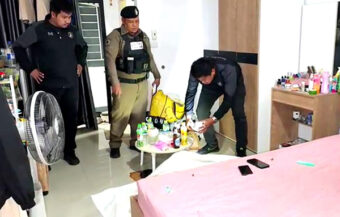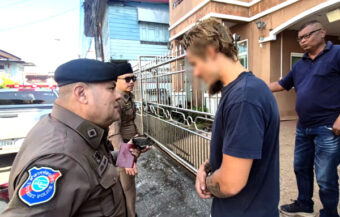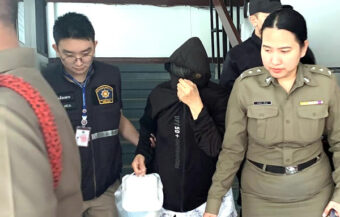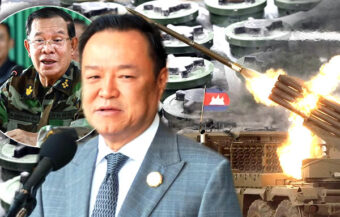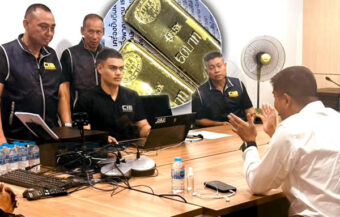Former Deputy PM and Finance Minister Dr Suchart calls for a liquidity injection and a weaker baht to revive Thailand’s economy, boost exports and tourism, warning the current price-half and half stimulus alone will have almost no impact on GDP.
A former Pheu Thai Party leader and Minister of Finance has urged the government to move toward a quantitative easing solution to tackle the overvalued Thai baht. Dr Suchart Thadathomrongwet, aged 73, called for a direct injection of liquidity into the system, effectively printing more Thai baht to boost liquidity, support exports, and sharpen Thailand’s competitiveness. His intervention comes only days after Bank of Thailand Governor Vithai Ratanakorn backed the need for a weaker baht, which market watchers say has been inflated by suspicious inflows into Thai financial markets in recent years.
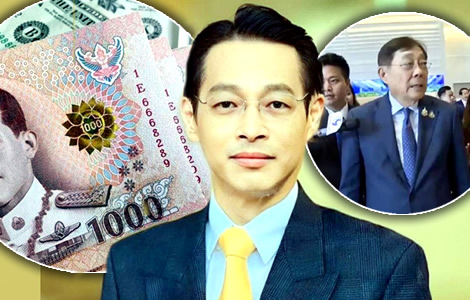
A former Minister of Finance has warned the government that its price-half and half stimulus programme will do almost nothing to lift GDP. The warning came from Dr Suchart Thadathomrongwet, who served as finance minister in the administration of former Prime Minister Somchai Wongsawat. Somchai is the brother-in-law of ex-Premier Thaksin Shinawatra.
Dr Suchart, who is seventy-three, also held the post of Minister of Education in the Yingluck Shinawatra government in 2012. He served as a leader of the Pheu Thai Party in 2008. His long record in senior roles gave his remarks added weight.
On Monday, Dr Suchart said the current stimulus would only create short bursts of spending. He stressed that the plan promoted by Prime Minister Anutin Charnvirakul’s government did not support broad economic recovery.
Former finance minister warns half-and-half stimulus will have little impact on GDP or economic recovery
He said the programme would not repair Thailand’s main economic weaknesses. Instead, he argued that any real GDP revival required stronger exports and better tourism numbers. These sectors supply 70% to 80% of national output. The balance, he said, is too large to ignore.
Furthermore, he pointed to current economic data. He noted that manufacturing sector utilisation was running at 50% to 60%. He said the figures signalled weak demand and limited production activity. He added that foreign tourism had already declined this year. The combined trends, in his view, explained the strain on the economy. He argued that domestic subsidies could not offset those structural pressures.
Moreover, Dr Suchart said the Thai baht remained overvalued. He linked that valuation to slower export orders. He also linked it to weaker tourism flows. He noted that a high baht raised costs for foreign buyers. He said it also discouraged travellers. He added that the currency level was out of line with economic conditions. His assessment pointed directly at the baht as a central obstacle.
Dr Suchart points to the overvalued baht as the central factor slowing exports and foreign tourism
His comments came only hours after new Bank of Thailand Governor Vithai Ratanakorn voiced similar concerns. Vithai called for a lower baht. His statement signalled a new tone inside the central bank. It also highlighted rising concern among policymakers. Dr Suchart’s remarks therefore landed during an active debate on the currency.
The issue resurfaced after the government of Paetongtarn Shinawatra was removed following the Constitutional Court’s August ruling. Before its dismissal, the government had been preparing a major economic initiative.
Former Minister of Finance Pichai Chunhavajira had been exploring a Thai-style quantitative easing plan. Reports described the proposal as a liquidity-expansion measure. The plan aimed to print more money and inject credit into the system.
In theory, this approach would push funds into economic channels. It would also weaken the baht and raise competitiveness. The plan, however, was still under review when the government left office. No final decision had been taken.
Central Bank boss and former finance minister signal quantitative easing to boost liquidity, weaken baht
Additionally, Dr Suchart did not address that earlier proposal. He remained focused on the current stimulus and the currency. He said the price-half and half scheme was too narrow. He argued that the model encouraged consumption but did not influence exports. He said it also did not affect tourism arrivals. Both areas, he noted, remained the backbone of the economy.
Manufacturing has also shown weakness. The 50% to 60% utilisation rate highlights unused capacity. It also signals limited orders. Dr Suchart said the figures show that factories are operating well below potential. He added that the sluggish trend harms employment and output. The data, he said, offered a direct measure of economic strain.
Tourism has not recovered to earlier levels. Numbers this year have fallen. Dr Suchart said the drop reflected wider conditions. He linked it to the currency. He said the baht’s value put Thailand at a price advantage. He added that travellers choose destinations based on cost. He argued that Thailand must acknowledge that pattern.
Dr Suchart highlights weak manufacturing and tourism trends as signals of ongoing economic strain
The new Bank of Thailand governor’s remarks added pressure to the situation. Vithai’s call for a weaker baht marked a shift from past positioning. The central bank will now face scrutiny over its next steps. Markets will watch for signals. Certainly, an interest rate reduction is now expected in December when the Monetary Policy Committee meets.
Exporters will watch for relief. Tourism operators will watch for value-related gains. The baht’s direction will influence all three groups. Meanwhile, the price-half and half stimulus remains a central part of the government’s domestic agenda. The plan encourages consumer spending through cost-sharing. Earlier rounds of similar schemes drew large numbers of participants.
The government promotes the programme as support for small businesses. It also views it as a tool to increase daily transactions. Dr Suchart’s assessment challenges the programme’s relevance. He said the scheme does not address export weakness. He said it does not repair declining tourism. He also said it does not fix currency pressure.
Stimulus cannot offset baht pressure or revive exports and tourism under prevailing conditions
Economic conditions currently show uneven performance. For example, manufacturing is subdued, while tourism is below expectations. At the same time, the currency remains strong, as it has risen by 12.8% since May 2024. Significantly, this is well ahead of nearly all of its regional peers. In addition, Dr. Suchart’s remarks expose gaps in the policy approach. Some officials have backed domestic stimulus, whereas others prioritise export conditions. Therefore, the divide has sharpened as officials plan the next phase of policy after recent political changes.
Thailand relies heavily on external demand. As a result, changes in tourism or exports always flow quickly into national data. Moreover, Dr. Suchart said the structure remains the same today and thus any solution must account for that fact. Furthermore, he pointed to competitiveness and external conditions as decisive factors.
He also tied them to the baht’s value. Additionally, he warned that ignoring those pressures would slow recovery. His comments, therefore, add weight at a sensitive time. Consequently, policymakers must balance consumer support with external realities. A liquidity injection, of course, has the advantage of also stimulating the economy without increasing government borrowing or expenditure.
Uneven economic performance and rising baht put pressure on policymakers to address competitiveness
The currency is undeniably central to the debate on the lacklustre economy. Manufacturing trends are sending a strong warning signal. Tourism levels have shocked economists in 2025. Dr Suchart’s warning, therefore, lands in a climate of concern and reassessment.
Furthermore, his long experience in finance and education lends authority to his analysis. His tenure as finance minister and former Pheu Thai Party leader places him among the most experienced voices on national policy. His critique of the stimulus plan is direct. His focus on exports and tourism is consistent with past economic patterns. His warning over the baht aligns with emerging central bank signals.
Bank of Thailand boss calls for a lower valued baht for an economy that is presently failing to perform
This is a key policy discussion. It is not known what the Bhumjaithai-led government’s position on the baht’s value is. Neither is it clear if the new government has any plans to resurrect the quantitative easing proposal discussed by the previous government.
However, it is something that should be debated. Here may be a key policy difference. At the same time, it should be noted that the Pheu Thai-led government never announced the policy formally. The opposition party’s position on it, as well as that of the People’s Party, should be heard.
Certainly, there is one other key advantage. It would undoubtedly dissuade Cambodian scammers and the Chinese mafia from funnelling funds into the baht if an effective devaluation of the currency is mooted.
Join the Thai News forum, follow Thai Examiner on Facebook here
Receive all our stories as they come out on Telegram here
Follow Thai Examiner here
Further reading:
Rate cut anticipated as outgoing Bank of Thailand governor attends last Monetary Policy Committee


